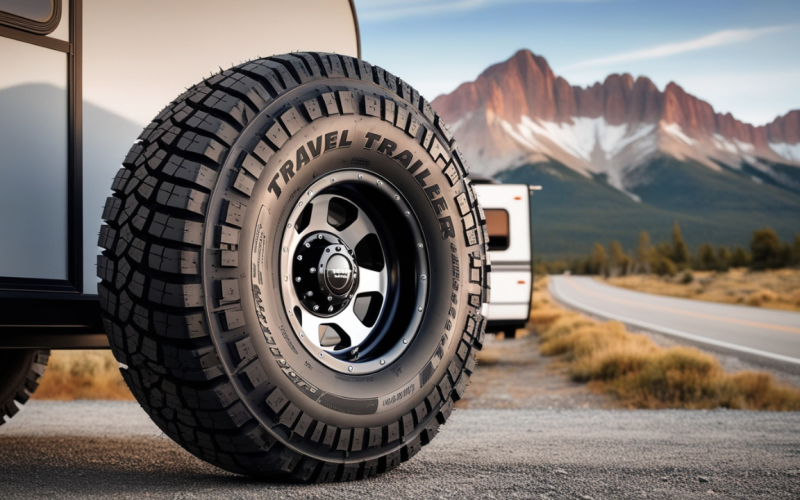Best Travel Trailer Tires, When you’re on the road with a travel trailer, one thing that can make or break your journey is the quality of your trailer tyres. Choosing the right tyres isn’t just about picking the right size; it’s about selecting tyres that provide safety, durability, and performance on the open road. In this guide, we’ll explore everything you need to know about finding the best travel trailer tyres for 2024.
From understanding the different types of trailer tyres to tips on maintenance, this article will give you the knowledge to make an informed decision.
Key Takeaways
- Choose a tire with the right load capacity to ensure it can handle your trailer’s weight.
- Consider radial tires if you plan to travel mainly on highways, as they’re designed for smoother rides and longer wear.
- Go with trusted brands like Goodyear, Sailun, or Carlisle for reliable performance and durability.
- Keep your tires inflated to the recommended PSI to avoid blowouts and prolong tire life.
- Look at sidewall strength and ply count to ensure the tire can support your specific travel needs.
Understanding Trailer Tires and Their Role in Safe Travel
Trailer tyres are unique because they’re specifically designed to manage the unique stresses of towing a travel trailer. Unlike car or truck tyres, trailer tyres handle heavy, static loads and frequent starting and stopping, making them essential for stability and safety. They also have stronger sidewalls to minimize swaying and provide a more controlled ride.
Trailer tyres generally come in two main types: radial and bias ply. Each has benefits depending on your travel habits, so understanding the differences can help you make a more informed choice.
Radial vs. Bias Ply Tires
Radial and bias ply tyres are the two primary types of trailer tyres, and each offers different benefits based on how and where you’ll be travelling.
Radial Tires
Radial tyres are constructed with steel belts running at a 90-degree angle to the tread. This design provides more flexibility, resulting in less heat buildup and a smoother ride, especially on highways. Radial tyres are popular among trailer owners who plan on long-distance travel or mainly drive on paved roads. They’re also generally longer-lasting than bias ply tyres, making them a practical choice for RV and travel trailer owners who value durability and comfort.
Bias Ply Tires
Bias-ply tyres have crisscrossed layers of nylon fabric under the tread. This design makes the tyre sidewalls stiffer, which can be beneficial for off-road or rugged terrain where you need more resilience against rough surfaces.
However, bias ply tyres wear out faster on highways compared to radial tyres and are usually more suited to shorter trips or mixed terrain. They tend to be less costly than radial tyres, so they might be a good option if you’re primarily using your trailer for short, off-road trips.
LT (Light Truck) Tires vs. ST (Special Trailer) Tires
Another factor in trailer tyre selection is whether to go with LT (Light Truck) tyres or ST (Special Trailer) tyres. While some people opt for LT tyres, ST tyres are specifically designed for trailers and offer advantages like better towing stability, superior load capacity, and less swaying.
ST Tires
These are designed specifically for trailer use, making them the best choice for most travel trailers. ST tires have a stronger sidewall to prevent swaying, which is critical for the stability of a trailer on the road. They also have a higher load capacity, which makes them safer for heavier trailers, like those used in RVs and 5th wheels.
LT Tires
Some trailers, particularly those built for off-road conditions, use LT tyres. While they can be used on trailers, they’re not always ideal for long-distance towing on highways because they don’t handle trailer-specific load requirements as effectively as ST tyres. LT tyres might work well for short or off-road hauls, but ST tyres generally remain the recommended choice for consistent towing needs.
Key Factors When Choosing Travel Trailer Tires
Selecting the best travel trailer tyre goes beyond choosing the correct size. Load capacity, durability, and maintaining proper tire pressure are essential to ensure the safety and longevity of your tires.
Load Capacity and Weight Ratings
When choosing trailer tyres, load capacity is crucial. Tires with a higher load rating can handle more weight, which is important for trailers that carry heavy loads. Each tyre comes with a load rating, which refers to the maximum weight it can safely support.
It’s essential to match the tire’s load rating with your trailer’s weight to avoid overloading, which can lead to blowouts, increased wear, and reduced control.
For example, if you have a larger trailer, you’ll want a tyre with a higher load range, such as Load Range G. Load Range ratings are typically marked with letters like C, D, or G, with each letter indicating an increase in load capacity.
A Load Range G tyre, for instance, has a higher load capacity than a Load Range D tyre, which is beneficial for trailers with more weight. To ensure safety, always choose a tire with a load range compatible with your trailer’s Gross Vehicle Weight Rating (GVWR), as using an under-rated tire can be dangerous and lead to premature wear.
| Load Range | Tire Load Capacity (lbs) | Recommended PSI |
|---|---|---|
| C | Up to 1,820 | 50 psi |
| D | Up to 2,540 | 65 psi |
| G | Up to 3,750 | 110 psi |
Durability and Sidewall Strength
Trailer tires need to be durable to handle the stress and weight of towing. The sidewall strength, often determined by the ply count, helps ensure the tyre remains stable under load. A higher ply count, such as 10 or 14, provides more stability, which is essential for heavier trailers or long-distance travel.
Steel-belted sidewalls, as opposed to nylon sidewalls, are known to be more durable and less prone to bulging or cracking. Nylon sidewalls may be lighter, but they don’t offer the same level of protection as steel-belted ones, especially for high-stress travel conditions. Choosing a tyre with durable sidewalls ensures that it can withstand the heat and stress of long trips, especially on highways where the constant speed generates more friction and heat.
Top Trailer Tire Brands for 2024
With so many options on the market, knowing which brands provide reliability and performance can help narrow down your choices. Here are some of the top-rated brands for travel trailer tires in 2024, trusted by RV and travel trailer communities.
Goodyear Endurance Tires
Goodyear Endurance tyres have become a top choice among trailer owners due to their durability, load capacity, and high-speed rating. Known for their strong construction, Goodyear Endurance tires have reinforced sidewalls and are designed to handle long-distance towing.
These tyres are popular for RVs, 5th wheels, and boat trailers because they offer stability and reduced sway, especially at highway speeds. Goodyear Endurance tyres are built in the USA and have earned positive reviews from RV and trailer owners who prioritize quality and performance. While they may be pricier than some other brands, many users find the extra cost worth it for the added peace of mind.
Sailun Tires
Sailun is another trusted brand known for its heavy-duty trailer tyres that cater to larger, weightier travel trailers. Sailun tires are often recommended by RV communities for their load capacity and durability, making them a great option for trailers with heavier loads.
They’ve gained a reputation for being reliable and are frequently praised in RV forums for their value and performance under tough towing conditions. Sailun tires are manufactured in China, but despite this, they’ve maintained a strong following in the RV and trailer community, especially for those looking for durable tires on a budget.
Carlisle Tires
Carlisle tires are well-regarded for their strength and durability, making them ideal for heavy-duty applications like 5th wheels and RV trailers. Known for producing sturdy, long-lasting tires, Carlisle tires are designed to withstand the demands of towing.
These tires are a solid choice for drivers who often tow in varied conditions, such as highways and off-road trails. The brand offers a range of options suitable for different trailer sizes, and they are known to hold up well even under frequent use.
Maxxis Tires
Maxxis is another brand recognized for making quality trailer tyres, especially those used in off-road or heavy-duty applications. Maxxis tyres are known for their reliability and ability to withstand tough travel conditions, including gravel and unpaved roads.
They’re popular among RV owners who occasionally venture off the beaten path, as these tyres have strong sidewalls and treads that can handle uneven surfaces. While Maxxis tyres may be a bit pricier than other brands, they offer great value for those who prioritize longevity and toughness in varied terrains.
How to Maintain and Maximize Tire Life
Good maintenance practices are essential to extending the lifespan of your trailer tyres and ensuring safety on the road. Properly maintained tyres perform better, last longer, and significantly reduce the risk of blowouts. Here are the key steps to keep your travel trailer tyres in top shape.
Regular Tire Inspections
Regular inspections help catch potential issues early, preventing more significant problems down the line. Check your tyres every time you prepare for a trip, and give them a quick inspection after long journeys.
Start by examining the tread depth. Tires with insufficient tread won’t grip the road properly, especially in wet conditions. Look for signs of uneven wear, which could indicate issues with tire pressure, alignment, or balance. Make sure to also check the sidewalls for cracks, bulges, or other damage, as these can be signs of weakened areas that are more prone to blowouts. Even if your tread depth is fine, damaged sidewalls can still make the tire unsafe.
Proper Tire Pressure Management
Maintaining the correct tire pressure is one of the most important aspects of trailer tire maintenance. Tire pressure directly impacts handling, fuel efficiency, and tire life. Underinflated tyres generate more heat due to increased friction, leading to faster wear and an increased chance of blowouts. On the other hand, overinflated tyres can result in a harsher ride and reduced traction.
To determine the optimal pressure, check the tire’s sidewall markings for the recommended PSI and ensure they’re inflated to this level when cold. Invest in a Tire Pressure Monitoring System (TPMS) for real-time monitoring while you’re on the road. TPMS alerts you if any tire’s pressure drops or rises unexpectedly, allowing you to address issues immediately.
Replacement Guidelines
Even with proper maintenance, trailer tyres need to be replaced periodically. Most experts recommend replacing trailer tires every three to five years, regardless of tread condition, due to wear and aging rubber. The rubber in tires deteriorates over time, which weakens the tire structure and makes it more susceptible to cracks, blowouts, and loss of performance.
Signs that it’s time for replacement include frequent flats, visible tread wear indicators, and sidewall cracking. If you use your trailer frequently, consider replacing your tyres sooner to ensure continued reliability and safety.
Common Issues with Trailer Tires and How to Avoid Them
Trailer tyres face unique stresses that can lead to various issues if not properly managed. Here are some common problems, along with tips to prevent them.
Tire Blowouts and Underinflation
One of the most frequent issues trailer owners encounter is tyre blowouts, often caused by underinflation. When a tyre is underinflated, it becomes softer and more flexible, increasing heat buildup as it rolls. This excess heat can weaken the tyre’s internal structure and lead to a blowout, especially at highway speeds.
Prevent blowouts by ensuring your tyres are always inflated to the recommended PSI. Use a TPMS to monitor pressure on the road and check the pressure before each trip. Also, avoid overloading your trailer, as carrying too much weight puts extra strain on the tyres.
The Risk of “China Bombs”
In RV and trailer communities, low-quality tyres manufactured in China are sometimes referred to as “China Bombs” due to their reputation for blowouts and quick deterioration. While not all Chinese-made tyres are problematic, some budget brands don’t meet the same standards as reputable names. Cheap tyres may save money upfront but can lead to dangerous situations on the road.
Opt for trusted brands with strong reviews, such as Goodyear, Sailun, and Carlisle, to ensure safety and reliability. Higher-quality tyres typically have more rigorous testing and quality control, giving you added peace of mind.
Ageing Tyres and Dry Rot
Tyre ageing is a common issue, especially for trailers that spend a lot of time parked in one location. When tyres are exposed to sunlight and changing weather conditions, the rubber can dry out and crack, a condition known as dry rot. This weakens the tire’s structure and increases the chance of blowouts.
To prevent dry rot, try to keep your trailer parked in a shaded area or use tire covers to block direct sunlight. Regularly check for cracks on the sidewalls and tread surface, as these indicate the rubber is drying out and the tires need replacement.
Recommended Tire Sizes and Ratings
Choosing the right size and load rating is essential for maximizing performance and safety. Trailer tires come in a variety of sizes, so it’s important to choose one that fits your trailer specifications. Here’s a closer look at how to select the best tire size and load rating.
Choosing the Right Size for Your Trailer
Each trailer tire has a specific size that determines its diameter, width, and load capacity. Tire sizes are typically indicated on the sidewall with numbers like 205/75R15, where “205” refers to the tire width in millimeters, “75” is the aspect ratio (the height compared to width), and “15” is the diameter in inches.
To find the right size for your trailer, consult your trailer’s manual or check the current tires. It’s essential to use the size specified by the manufacturer to ensure compatibility with your trailer’s wheel wells and axle spacing. Using the wrong size can impact the trailer’s handling, stability, and load capacity.
Understanding Load Ratings and GVWR Requirements
Load rating is a critical factor when choosing trailer tires. It indicates how much weight each tire can safely carry at the recommended PSI. If your trailer has a higher Gross Vehicle Weight Rating (GVWR), you’ll need tires with a higher load rating to safely support the load.
For example, Load Range G tires are designed for heavier trailers and can carry more weight than Load Range D or C tires. Choosing a tire with the correct load rating is essential for preventing overloading, which can lead to blowouts and uneven tire wear. Always make sure your tire’s load rating matches or exceeds your trailer’s GVWR to ensure safe towing.
| Tire Size | Load Range | Max Load Capacity (lbs) | Recommended PSI |
|---|---|---|---|
| 205/75R15 | C | 1,820 | 50 psi |
| 225/75R15 | D | 2,540 | 65 psi |
| 235/80R16 | G | 3,750 | 110 psi |
My Opinion
Selecting the right tires for your travel trailer doesn’t have to be overwhelming. By focusing on load capacity, tire type, and brand quality, you can find tires that provide safety, comfort, and longevity on the road. Maintaining proper tire pressure, performing regular inspections, and replacing aging tires are essential steps to keep your travel trailer safe and ready for adventure.
With the right tires, you’ll have peace of mind knowing that your trailer can handle the journey, no matter where the road takes you.






